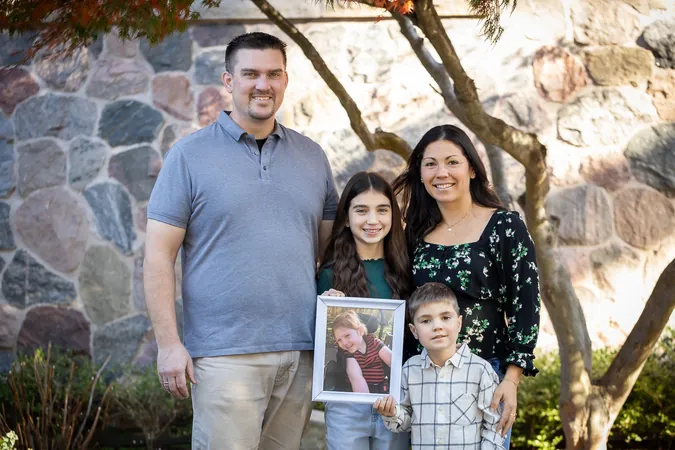
Honoring Julia's Inspiring Legacy: A Breakthrough in Genetic Counseling and Care
2024-11-27
Author: Noah
In the realm of modern health care, genetic counseling stands out as a crucial service that provides clarity and support to individuals and families grappling with genetic conditions from birth through adulthood. At McMaster Children’s Hospital (MCH) in Hamilton, the Genetics & Metabolics Clinic is leading the charge with tailored genetic testing and assessment, family counseling, and comprehensive management for patients diagnosed with genetic disorders. This support system was exemplified in the journey of Katie and Dave Simpson with their daughter, Julia.
A Remarkable Journey
Born in 2012, Julia's early years were overshadowed by her failure to meet developmental milestones. Initially, her parents suspected vision problems, hoping she might simply need glasses, but soon they were faced with the harsh reality of frequent seizures—up to twelve per day. After two long years of uncertainty, Julia was diagnosed with a rare genetic disorder known as Lethal Neonatal Rigidity and Multifocal Seizure Syndrome (RMFSL), attributed to mutations in the BRAT1 gene. Julia’s case was especially painful for her family to bear — she was one of only six known cases globally.
“It was devastating news,” Katie reflected, recalling the initial shock and sense of isolation they faced without clear answers about Julia's future. In those trying times, the Simpson family found a steadfast ally in Lauren Brick, the lead genetic counselor at MCH. With her steadfast support, the family was able to navigate the complex medical landscape and make informed decisions during Julia's care.
Defying the Odds
Determined to give Julia a joyful life, Katie and Dave focused on her well-being for the six years they had with her. Despite the prognosis, Julia thrived in the loving environment of her home and school, where classmates and her little sister Evie adored her. “She was a rock star at school. They cherished her,” Katie shared, recalling how Julia's joyful spirit lit up their lives even as her condition progressed.
The family prioritized Julia's comfort, opting for a quality of life over invasive medical interventions. They created cherished memories, spending her last days in the comfort of their home. Julia passed away in February 2018, at just six years old, but her legacy continues through hearts touched by her life and the increased awareness of genetic disorders.
Empowering Genetic Awareness
Julia’s unique presentation of the rare disorder added significant insight into the BRAT1 gene's mutations, prompting her care team to publish an influential paper in *Pediatric Neurology* in 2015, aimed at raising awareness. By highlighting the genetic condition's variety in presentation, the article was instrumental in helping medical professionals better recognize and manage the disorder in other patients.
As genetic research evolves, so too do the understandings of these conditions. Julia’s initial diagnosis provided the groundwork for a more nuanced label, neurodevelopmental disorder with cerebellar atrophy with or without seizures (NEDCAS), reflecting the variability in symptoms among patients.
A Legacy of Love and Hope
In the face of loss, Katie and Dave turned to the genetics service at MCH for their family planning. Through in vitro fertilization and embryo screening, they welcomed their son, Tommy, in 2020. “Knowing we had a healthy child was an incredible relief,” Katie expressed, underscoring their commitment to ensuring the future health of their family.
Transforming Access to Genetic Care
The impact of timely genetic counseling cannot be overstated. Prior to recent funding increases, families faced unbearable wait times—up to 19 months—for appointments at MCH. Thanks to a historic investment of over $48 million by the provincial government, the hospital has expanded its genetics team, reducing wait times to just eight months and allowing hundreds of families access to essential services.
“The changes have been life-changing for so many families,” says Brick. “Individuals are now able to move forward with testing, family planning, and medical management without excessive delays that can significantly affect their lives.”
Continued Advocacy for Genetic Services
While the progress made is significant, experts like Brick emphasize the ongoing need for equitable access to genetic services across Ontario. Julia’s story serves as both a reminder of the importance of innovation in genetic research and care and as a testament to the enduring love and joy one child can bring into the world.
Katie sums it up beautifully: "Julia was the life that just keeps giving. Her love and joy have become part of our mission to advocate for awareness and access in genetic counseling."
Julia's journey has not only inspired a movement in genetic awareness but also transformed the landscape for families facing similar challenges, creating hope for many who seek answers in the confusing world of genetic health.









 Brasil (PT)
Brasil (PT)
 Canada (EN)
Canada (EN)
 Chile (ES)
Chile (ES)
 España (ES)
España (ES)
 France (FR)
France (FR)
 Hong Kong (EN)
Hong Kong (EN)
 Italia (IT)
Italia (IT)
 日本 (JA)
日本 (JA)
 Magyarország (HU)
Magyarország (HU)
 Norge (NO)
Norge (NO)
 Polska (PL)
Polska (PL)
 Schweiz (DE)
Schweiz (DE)
 Singapore (EN)
Singapore (EN)
 Sverige (SV)
Sverige (SV)
 Suomi (FI)
Suomi (FI)
 Türkiye (TR)
Türkiye (TR)